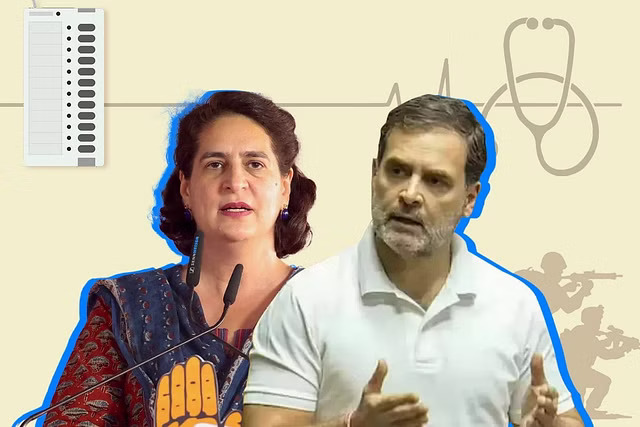In the past 24 days, Rahul Gandhi and Priyanka Vadra have made numerous false claims regarding issues such as paper leaks, EVM controversies, and compensation for Agniveer martyrs. Now, the truth behind all these claims is being revealed. Recently, the Indian Army has strongly responded to claims made by Congress leader Rahul Gandhi. This matter relates to the compensation to Agniveer Ajay Singh’s family, who died in a landmine explosion in January. Rahul Gandhi’s claims and the Army’s response have heated up the political atmosphere.
Rahul Gandhi’s Claim:
Congress leader Rahul Gandhi alleged that Defense Minister Rajnath Singh falsely claimed in Parliament that Agniveer martyrs’ families were compensated with ₹1 crore. He stated that Agniveer Ajay Singh’s family received no compensation and demanded an apology from the Defense Minister to Parliament, the nation, the Army, and Ajay Singh’s family.
Indian Army’s Response:
Following Rahul Gandhi’s assertions, the Indian Army promptly refuted his claims with a statement confirming that Agniveer Ajay Singh’s family had already received ₹98 lakhs in compensation. Additionally, the Army clarified that a total of ₹1.65 crore, inclusive of ₹67 lakhs in other benefits, was earmarked for Ajay Singh’s family. This clear and detailed response underscored the Army’s commitment to transparency and factual accuracy, countering the allegations and aiming to provide clarity amidst the political controversy.
Political Context:
The ongoing debate between Rahul Gandhi’s assertions and the Indian Army’s rebuttals has ignited fresh controversy within Indian politics. Rahul Gandhi’s history of contentious claims, often later refuted, further intensifies the scrutiny on his statements. Such instances not only amplify political tensions but also underscore the importance of factual accuracy in public discourse. They highlight the challenge of maintaining credibility in leadership roles and navigating the complexities of public trust amid contrasting narratives. In a democratic framework, these episodes emphasize the critical role of transparent communication and verifiable information in shaping public opinion and governance.
Previous Incidents:
Claims made by Rahul Gandhi and other members of his family (such as Priyanka Gandhi Vadra) have been contentious in the past. Some of these incidents include:
Paper Leak Issue: In June, Rahul Gandhi leveled serious allegations against BJP-led states, accusing them of being hubs for paper leaks. Specifically targeting BJP-governed states, he claimed they were responsible for widespread incidents of leaked papers. In a swift rebuttal, the BJP pointed to instances of paper leaks in Rajasthan, effectively countering Gandhi’s accusations. This exchange underscored the intense political rivalry between the Congress and BJP, where allegations and counter-allegations are common strategies to gain leverage and discredit opponents. Such controversies not only fuel political tensions but also raise concerns about the integrity of educational and administrative systems.
EVM Controversy: Rahul Gandhi raised concerns regarding the transparency of Electronic Voting Machines (EVMs), citing an alleged incident in Mumbai suggesting possible tampering. Relevant authorities later refuted his claims as “fake news.” The Election Commission of India and other investigative bodies thoroughly examined the alleged incident and found no evidence supporting Rahul Gandhi’s assertions. This episode underscored the sensitivity and scrutiny surrounding electoral integrity in India, where the accuracy and reliability of voting mechanisms are paramount to maintaining public trust in democratic processes.
The NEET exam issue: Priyanka Gandhi Vadra had shared a claim by NEET aspirant Ayushi Patel, alleging discrepancies in her results. Later, this claim proved false, prompting BJP to demand an apology from Priyanka Gandhi Vadra and advocate for legal action.
Conclusion:
Rahul Gandhi’s assertions and the swift rebuttal by the Indian Army have reignited fervent debate within Indian political circles. These controversies underscore public scrutiny over leaders’ credibility and amplify existing political tensions. Such episodes underscore the critical role of truth and transparency in democratic governance, pivotal for fostering trust among citizens. In a robust democracy, the dissemination of accurate information serves as a cornerstone, guiding informed public discourse and ensuring accountability across all levels of governance and leadership.
ALSO READ: Almost 10 Bridges Collapsed in Bihar in less than 3 Weeks due to……..?
